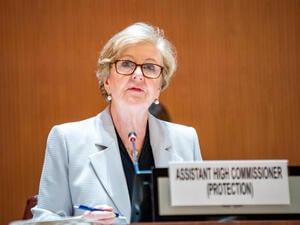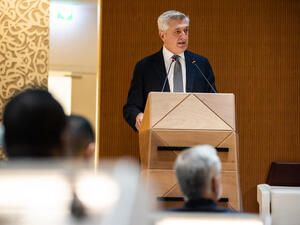UNHCR chief Guterres backs planned Greek asylum reform
UNHCR chief Guterres backs planned Greek asylum reform

UN High Commissioner for Refugees António Guterres (left) and Greek Prime Minister George Papandreou address the press in Athens.
ATHENS, Greece, January 20 (UNHCR) - UN High Commissioner for Refugees António Guterres on Wednesday welcomed plans by the Greek government to undertake an ambitious reform of the country's asylum system and pledged his agency's full support. He called the tasks facing Greece in the area of migration and asylum "exciting in their nature" and "humbling in their scope and complexity."
Guterres had earlier discussed the interrelated issues of migration and asylum and Greece's bold reform proposals during meetings in Athens on Tuesday and Wednesday with Prime Minister George Papandreou, several key cabinet ministers and independent experts.
Papandreou stressed the complex position facing Greece, which is a key entry point into the European Union (EU) for refugees and irregular migrants, and stressed that managing the situation was among his top priorities.
He said that his government had the political will to reform its asylum system, which he intends to bring into conformity with the 1951 Refugee Convention and EU law. Papandreou said his vision was to create a modern and effective migration and asylum system that fully respects human rights.
UNHCR has in the past pointed out many failings in Greece's asylum system. But the High Commissioner welcomed the government's plan to undertake ambitious reforms as part of a comprehensive approach to asylum, migration and integration, "which will make the system fully compatible with international law and the Greek tradition of hospitality."
Guterres noted that the broad measures planned, including legislative proposals relating to naturalization, would contribute to human rights and social cohesion and were squarely in Greece's national interest.
He offered UNHCR's unwavering support and pledged to do his best to attract EU solidarity for this task. Pending the implementation of the asylum reforms, however, UNHCR would maintain its recommendation to other European states not to send asylum-seekers back to Greece (as the first point of entry into Europe) under EU or other regulations.
A situation where asylum-seekers and migrants were obliged to live in a clandestine manner was not in anyone's interest, noted Guterres, who supported proposals for a system for reception and screening of new arrivals, with the referral of asylum-seekers to a fair and efficient asylum procedure managed by an independent asylum authority.
Refugees and others in need of international protection should be identified rapidly, he said, noting that states have the right to send back to their countries of origin people who are not in need of protection, although such readmission remains a "huge challenge." He stressed the particular problem of unaccompanied children, both asylum-seekers and migrants, and called for special measures to ensure their protection and well-being.
By Ketty Kehayioylou in Athens, Greece








